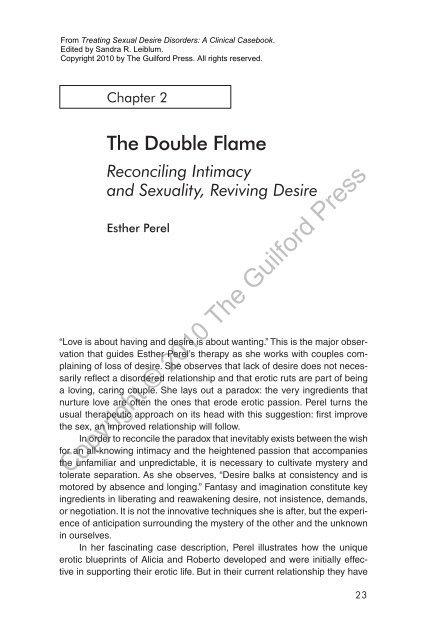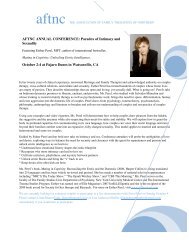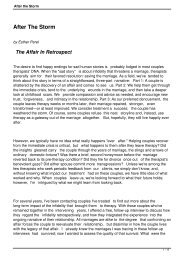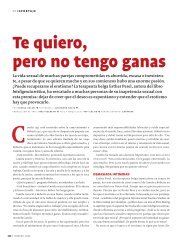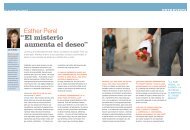The-Double-Flame 2.pdf - Esther Perel
The-Double-Flame 2.pdf - Esther Perel
The-Double-Flame 2.pdf - Esther Perel
You also want an ePaper? Increase the reach of your titles
YUMPU automatically turns print PDFs into web optimized ePapers that Google loves.
From Treating Sexual Desire Disorders: A Clinical Casebook.<br />
Edited by Sandra R. Leiblum.<br />
Copyright 2010 by <strong>The</strong> Guilford Press. All rights reserved.<br />
Chapter 2<br />
<strong>The</strong> <strong>Double</strong> <strong>Flame</strong><br />
Reconciling Intimacy<br />
and Sexuality, Reviving Desire<br />
<strong>Esther</strong> <strong>Perel</strong><br />
“Love is about having and desire is about wanting.” This is the major observation<br />
that guides <strong>Esther</strong> <strong>Perel</strong>’s therapy as she works with couples complaining<br />
of loss of desire. She observes that lack of desire does not necessarily<br />
reflect a disordered relationship and that erotic ruts are part of being<br />
a loving, caring couple. She lays out a paradox: the very ingredients that<br />
nurture love are often the ones that erode erotic passion. <strong>Perel</strong> turns the<br />
usual therapeutic approach on its head with this suggestion: first improve<br />
the sex, an improved relationship will follow.<br />
In order to reconcile the paradox that inevitably exists between the wish<br />
for an all-knowing intimacy and the heightened passion that accompanies<br />
the unfamiliar and unpredictable, it is necessary to cultivate mystery and<br />
tolerate separation. As she observes, “Desire balks at consistency and is<br />
motored by absence and longing.” Fantasy and imagination constitute key<br />
ingredients in liberating and reawakening desire, not insistence, demands,<br />
or negotiation. It is not the innovative techniques she is after, but the experience<br />
of anticipation surrounding the mystery of the other and the unknown<br />
in ourselves.<br />
In her fascinating case description, <strong>Perel</strong> illustrates how the unique<br />
erotic blueprints of Alicia and Roberto developed and were initially effective<br />
in supporting their erotic life. But in their current relationship they have<br />
Copyright © 2010 <strong>The</strong> Guilford Press<br />
23
24 TREATING SEXUAL DESIRE DISORDERS<br />
fallen into the familiar roles of pursuer and distancer, which satisfies neither.<br />
Furthermore, the way they are emotionally organized around each other is<br />
too reminiscent of their original families, which inevitably numbs all forms of<br />
sexual expressiveness.<br />
<strong>The</strong> therapy engages the partners to uncover and to free themselves<br />
from their erotic blocks. Like so many women, Alicia dislikes Roberto’s sexual<br />
directness, which she experiences as neediness. She wants seduction and<br />
transgression to lift her from her internalized prohibitions. For Roberto, familiarity<br />
breeds content and he values comfort and intimacy to spark his desire.<br />
Once they are encouraged to use their imagination and to discover new<br />
ways of seducing and beguiling each other, their erotic desire increases.<br />
<strong>Perel</strong> concludes her chapter with the reminder that in long-term relationships,<br />
active engagement and willful intent are needed to nurture eroticism<br />
and maintain desire.<br />
<strong>Esther</strong> <strong>Perel</strong>, MA, LMFT, is a practicing marital and family therapist<br />
in New York City. She is the author of Mating in Captivity: Reconciling the<br />
Erotic and the Domestic, which has been translated into 24 languages. She<br />
is recognized as one of the most original and provocative theorists in the<br />
field of sex therapy today.<br />
ThE DomEsTic anD ThE EroTic<br />
As a couple therapist, I see young and old, married or not, gay, bisexual,<br />
and straight, with passports from all over the world. Plenty has<br />
changed in my 25 years of private practice, but not my patients’ opening<br />
lines. <strong>The</strong>y tend to go something like this: “We love each other<br />
very much, but we have no sex.” Next they’ll move into describing<br />
relationships that are open and loving, yet sexually dull. Time and<br />
again they tell me of the paradoxical relationship between domesticity<br />
and sexual desire. <strong>The</strong>y treasure the stability, security, and predictability<br />
of a committed relationship, they miss the excitement, novelty,<br />
and mystery that eroticism thrives on.<br />
When they complain about the listlessness of their sex lives, they<br />
sometimes want more frequent sex, but they always want “better”<br />
sex. <strong>The</strong>y want to recapture the feeling of connection, playfulness,<br />
and renewal that sex used to allow them.<br />
Modern committed couples have a long list of sexual alibis that<br />
claim to explain the death of eros. <strong>The</strong>y are too busy, too stressed,<br />
and too tired for sex. Eventually lamentations about the kids, the<br />
house, the job trail off, and more complex and nuanced obstacles<br />
Copyright © 2010 <strong>The</strong> Guilford Press
<strong>The</strong> <strong>Double</strong> <strong>Flame</strong> 25<br />
come forward: couples who are such good friends they cannot sustain<br />
being lovers; lovers so set on spontaneity that sex never happens at<br />
all. I see power struggles that escalate into erotic stalemates, emotional<br />
arrangements that are overly familial and blatantly desexualizing.<br />
Some clients feel sheepish, others rejected, and some are just plain<br />
confused—all of them, however, have experienced a genuine loss.<br />
So why does great sex so often fade for couples who love each<br />
other as much as ever? Why does good intimacy not guarantee good<br />
sex? Why does the transition to parenthood spell erotic disaster? Can<br />
we want what we already have? Why is the forbidden so erotic? When<br />
we love, how does it feel, and when we desire, how is it different?<br />
I seek to probe the ambiguities of love and desire in long-term<br />
relations, to explore the fears and anxieties that arise when our pursuit<br />
of safety and security clashes with our quest for passion and adventure.<br />
We seek predictability on one hand, and thrive on discovery<br />
and adventure on the other. Psychoanalyst Steven A. Mitchell (2002)<br />
makes the point that these are two fundamental, yet opposing human<br />
needs that pull us in different directions. Partners today need to negotiate<br />
their dual needs for familiarity and novelty, their wish for certainty<br />
and surprise. Yet it is difficult to generate excitement and anticipation<br />
with the same person we look to for comfort and stability.<br />
In the West we take for granted the idea that marriage is the key<br />
to everything. We turn to one person to fulfill what an entire village<br />
(friends, community, extended family) once delivered. We expect our<br />
partners to be the primary supplier for our emotional connections, to<br />
provide the anchoring experiences of life. Intimacy and transparency<br />
in the romantic marriage are paramount, meant to help us transcend<br />
the aloneness of modern existence and be a bulwark against the vicissitudes<br />
of everyday life. We seek security, as we always have, but now<br />
we also want our partner to love us, cherish us, and excite us. For<br />
the first time in history, we have sex not because we want eight kids<br />
or because it’s the woman’s marital duty; today’s couples count on<br />
desire and sexual fulfillment as key ingredients to a happy marriage. I<br />
believe we must recognize that reconciling the erotic and the domestic<br />
is not a problem we can solve, it is a paradox we manage.<br />
Copyright © 2010 <strong>The</strong> Guilford Press<br />
ThE numbing oF DEsirE<br />
Traditional couple therapy believes that sexual problems stem from<br />
relationship problems. Poor communication, lack of intimacy, and
26 TREATING SEXUAL DESIRE DISORDERS<br />
accumulated resentments are some of the explanations given to<br />
explain the numbing of desire. Find out about the state of the union<br />
first, see how it manifests in the bedroom second. <strong>The</strong> premise is that<br />
a troubled relationship equals no sex; improve the emotional relationship,<br />
and the desire will follow.<br />
But my practice suggests otherwise. I’ve helped plenty of couples<br />
buff up their relationship and it did nothing for the sex. It made a<br />
difference in the kitchen, but it did little for the bedroom. Strengthening<br />
the caring and the companionate affection is often not enough to<br />
generate erotic desire. In such situations, I invert the traditional therapeutic<br />
priorities, asking about the partners’ sexuality first. It becomes<br />
a window into the self, the couple’s dynamics, and their families of<br />
origin. I flip the equation: improve the sex, and the relationship will<br />
follow. Sex is not a metaphor for the relationship, but rather a parallel<br />
narrative, one that speaks its own language.<br />
Love and desire—they relate and they conflict, and herein lies the<br />
mystery of eroticism. <strong>The</strong> rules of desire are not the same as the rules<br />
of good citizenship. It is not always the lack of closeness that stifles<br />
desire, but too much closeness. Many couples are disappointed to<br />
discover that the closeness and comfort they crave are exactly what<br />
douses the fire. More intimacy doesn’t always make for more sex. In<br />
fact, sometimes the very qualities that nurture intimacy—grounding,<br />
familiarity, and continuity—can be sexually deflating and drain the<br />
passion right out of our relationships.<br />
Stability, understanding, and compassion are the handmaidens of<br />
a close, harmonious relationship, while eroticism thrives on novelty,<br />
mystery, and the unexpected. <strong>The</strong>re is a complex relationship between<br />
love and desire—between a couple’s emotional life together and their<br />
physical life together, and these don’t always correspond. What is<br />
emotionally satisfying isn’t necessarily sexually exciting. That’s one<br />
reason why, to the chagrin of many, you can often “fix” the relation-<br />
ship and it will not do anything for the sex. Intimacy begets sexuality<br />
Copyright © 2010 <strong>The</strong> Guilford Press<br />
only sometimes.<br />
If love is about having, desire is about wanting. Love wants to<br />
contract distance, and minimize the threat; it wants to collapse the<br />
tension. It seeks closeness and wants to know the beloved. Desire<br />
balks at consistency and is motored by absence and longing. For some<br />
of us, love and desire are inseparable. But for many others, emotional<br />
intimacy inhibits erotic expression. For them, the caring, protective<br />
elements that foster love block the freedom and unself-consciousness<br />
that fuel erotic pleasure.
<strong>The</strong> <strong>Double</strong> <strong>Flame</strong> 27<br />
Let me illustrate: Think of a little child who sits comfortably nestled<br />
on your lap. At some point she jumps off and runs out. At a distance,<br />
she stops, turns, and get her cues from the adult she just left. If<br />
the adult says, “Go ahead, kiddo, the world is a beautiful place with<br />
lots to discover. Have fun,” the little child turns away and runs further.<br />
She experiences both freedom and connection, and at the same<br />
time, the security of love and the autonomy of desire. This child who<br />
plays hide and seek will one day turn to eroticism as the adult version<br />
of hide and seek, where she’ll maintain playfulness and discovery,<br />
alternating between the dangers of hiding and seeking and the relief<br />
of finding and being found.<br />
<strong>The</strong>re is, however, another scenario with a very different outcome.<br />
This time the adult says: “What’s so beautiful out there? Isn’t being<br />
together enough? I am lonely, I am anxious, depressed . . . ” Here,<br />
the child has a few choices. One of them is to return to base. <strong>The</strong>y<br />
learn that in order not to lose that connection with the other, they’ll<br />
have to lose a part of themselves. In my experience these are often the<br />
people who, later on, will have a hard time making love to the person<br />
they love. <strong>The</strong> legacy of this bargain for attachment produces a puzzling<br />
inverse correlation where growing intimacy leads to diminished<br />
desire. In his book Arousal: <strong>The</strong> Secret Logic of Sexual Fantasies,<br />
Michael Bader (2002) explains that it isn’t a fear of intimacy or a<br />
lack of commitment that solders their block, rather it is the nature of<br />
their love—burdensome and confining—that stands in the way of the<br />
desire. <strong>The</strong> worry and responsibility they feel for their beloved forecloses<br />
the necessary spontaneity and selfishness for erotic abandon.<br />
Sexual intimacy is an act of generosity and self-centeredness, of<br />
giving and taking. We need to be able to enter another without the<br />
terror that we will be swallowed and lose ourselves. At the same time<br />
we need to be able to enter ourselves, to surrender to self-absorption<br />
while in the presence of the other, believing that they will still be<br />
there when we return, that they won’t feel rejected by our momentary<br />
Copyright © 2010 <strong>The</strong> Guilford Press<br />
absence. <strong>The</strong> self absorption inherent in sexual excitement obliterates<br />
the other in a way that collides with the ideal of intimacy. So many<br />
people believe that they can be safely lustful and intemperate only<br />
with people they don’t know as well, or care about as much.<br />
Tell me how you were loved, I’ll tell you how you make love. This<br />
is a construct I often work with. Our sexual preferences arise from the<br />
thrills, challenges, and conflicts of our early life. How these bear on<br />
our threshold for closeness and pleasure is the object of our excavation.<br />
Not coincidentally, our entire emotional history plays itself out
28 TREATING SEXUAL DESIRE DISORDERS<br />
in the physicality of sex, and our erotic blueprints are layered with<br />
these childhood experiences.<br />
FirE nEEDs air<br />
Desire wants to go where it hasn’t yet been. It needs otherness, difference.<br />
But for erotic élan there needs to be a synapse to cross. Modern<br />
couples strive for oneness, yet eroticism thrives in the space between<br />
self and the other.<br />
Because this concept may seem abstract, I routinely ask the following<br />
question: “When do you feel most drawn, most attracted to<br />
your partner?” <strong>The</strong> answers resonate with a remarkable similarity.<br />
“After we’ve been apart . . ., when he’s confident and passionate<br />
about something he loves. . . . When she’s unaware I’m watching<br />
her. . . . When he is talking with friends. . . . When he surprises<br />
me. . . . When we’re at a party and I see others looking at her. . . .<br />
When she’s standing on the other side of a crowded room, and<br />
she smiles just for me. . . . When he’s playing with the kids. . . .<br />
[This is the only comment that is gender specific, for men rarely<br />
think that a mother playing with the kids is sexy.] When we’re<br />
away from home, and have fun together. . . . When we dance . . .<br />
When I ride on the back of his motorcycle . . . When I see him<br />
play sports. . . .<br />
Whatever the answer, it is never without an element of distance. It is a<br />
description where we look at our partner from a comfortable distance.<br />
Not too close because we cannot distinguish them from ourselves,<br />
and not too far, for then they are no longer in our field of vision. We<br />
see a partner who is separate, whose difference is magnified. And<br />
this person who is otherwise already so familiar is momentarily once<br />
again somewhat unknown, somewhat mysterious and elusive. More<br />
importantly, in none of these situations is the other needing us, nor<br />
do we need to take care of him or her. Caretaking may be very loving,<br />
but it is also a powerful anti-aphrodisiac. In sex, people want to feel<br />
wanted, not needed.<br />
We create a bridge of things unknown by making a perceptual<br />
shift, and it is on this bridge, in the space between us, that we can<br />
meet and play with the erotic. Sometimes introducing mystery is<br />
nothing more than a shift in perception. In the words of Proust, “<strong>The</strong><br />
Copyright © 2010 <strong>The</strong> Guilford Press
<strong>The</strong> <strong>Double</strong> <strong>Flame</strong> 29<br />
real voyage of discovery consists not in seeking new landscapes but in<br />
having new eyes.”<br />
<strong>The</strong> question posed earlier—“Can we want what we already<br />
have?”—invites us to admit that we never “have” our partners. It<br />
is our willingness to engage with the mystery that keeps desire alive.<br />
Faced with the irrefutable otherness of our partner, we can respond<br />
with fear or with curiosity. We can try to reduce them to a knowable<br />
entity, or we can embrace their persistent mystery. When we resist the<br />
urge to control, when we keep ourselves open, we preserve the possibility<br />
of discovery. Eroticism resides in the ambiguous space between<br />
anxiety and fascination. We remain interested in our partners; they<br />
delight us, and we’re drawn to them. It is not mere emotional anxiety,<br />
but rather the existential reality that there is no permanence, no<br />
lasting holding. When we trade passion for reality, maybe we are just<br />
trading one fiction for another. In the words of therapist Anthony<br />
Robbins, passion is commensurate with the amount of uncertainty<br />
we can tolerate.<br />
EroTicism as alivEnEss, PlEasurE, imaginaTion<br />
My interest is in the erotic, not only in the act of sex. <strong>The</strong> physical act<br />
of sex is often too narrow and it easily degenerates into conversations<br />
about numbers and performance. <strong>The</strong> erotic landscape is vastly larger,<br />
richer, and more intricate than the physiology of sex or any repertoire<br />
of sexual techniques. What people long for is radiance, beating back<br />
deadness.<br />
This focus on eroticism comes from my work with traumatized<br />
populations and from growing up in a community of Holocaust survivors,<br />
where I always observed two groups. <strong>The</strong>re were those who did<br />
not die, and those who came back to live. Those who didn’t die lived<br />
quite tethered to the ground, pouring their energies into finding basic<br />
trust, alleviating their fears, and guarding against a dangerous world<br />
outside. Pleasure for them was fraught with guilt and fear. Those who<br />
came back to live were eager to reenter the world, forge ahead, reconnect<br />
with playfulness and pleasure and take risks. <strong>The</strong>y understood<br />
how to cultivate aliveness, vibrancy; they experienced the erotic as an<br />
antidote to death. This distinction also applies to the couples I work<br />
with: there are those who survive and those who are alive. I think of<br />
eroticism beyond the sexual meaning that modernity has assigned to<br />
it. Couples who have an erotic spark know how to cultivate a sense of<br />
Copyright © 2010 <strong>The</strong> Guilford Press
30 TREATING SEXUAL DESIRE DISORDERS<br />
aliveness, vibrancy, and vitality over the long haul. <strong>The</strong>y understand<br />
that the central agent of eroticism is the imagination. Not the one that<br />
focuses on new sexual positions, but one where we continue to imagine<br />
our partner with a compelling curiosity and we remain interesting<br />
and attractive to ourselves.<br />
sEx anD inTimacy sPEak many languagEs<br />
No matter which country you are from, which language you first<br />
spoke, it is the language of the body that is the universal mother<br />
tongue. <strong>The</strong> body is a vital language, a conduit for emotional intimacy.<br />
As Roland Barthes wrote, “What language conceals is said<br />
through my body. My body is a stubborn child, my language is a very<br />
civilized adult.”<br />
<strong>The</strong> modern world of coupledom has done much in the way of<br />
censoring both men and women in this primal parlance. For men, the<br />
body is often the center of tenderness and vulnerability, and it longs to<br />
speak. Our emphasis (or overemphasis, rather) on the macho, powerdriven<br />
aspects of male sexuality works to mute the very expression<br />
we seek. Conversely, for women, the emphasis is on words, estranging<br />
them from a rich panoply of connection to their bodies. Any thoughts<br />
of lustfulness, physicality, or hunger are legitimized only when layered<br />
in relatedness or duty. With sex and intimacy at the epicenter of<br />
the couple’s identity, they need to give themselves permission to be<br />
bilingual.<br />
In the case example that follows, I illustrate how these concepts<br />
play out and how I use them to reignite desire in a couple that have<br />
lost their erotic life.<br />
casE ExamPlE: alicia anD robErTo<br />
Copyright © 2010 <strong>The</strong> Guilford Press<br />
Alicia and Roberto, an attractive, intelligent, and loving couple come<br />
for treatment, complaining of their moribund sex life. Alicia is 30,<br />
born in a small village in Andalucia, to a devout Catholic bourgeois<br />
family. Her mother came from a family of 12 children, ruled under<br />
the strict authority of her father. After meeting her husband-to-be she<br />
married him quickly and was whisked away. <strong>The</strong>y both shared the<br />
impatience of those who can’t wait to leave the hamlet and migrate to<br />
the big city, get an education, and move abroad. This is exactly what
<strong>The</strong> <strong>Double</strong> <strong>Flame</strong> 31<br />
they did, with two daughters in tow. Alicia was the oldest, and in her<br />
words: “I was my mom’s object.”<br />
In the various European countries where her family lived, she<br />
could attend local schools but not become a local girl. Her mother<br />
was critical of the permissiveness she saw in the postmodern families.<br />
Like many other traditional immigrant families who confront today’s<br />
Western culture of family democracy and its unprecedented child<br />
centrality, Alicia’s parents were critical of the permissiveness they<br />
observed. <strong>The</strong>y feared that unregulated freedom would expose their<br />
daughters to male predators, who would take advantage of them,<br />
sexually and emotionally.<br />
Mom and Dad divorced, and the restrictions only grew. Alicia<br />
had to jump through the window to play with her friends and rendezvous<br />
with her secret boyfriend. She pieced together a sexual education<br />
bit by bit. From Mom she learned about the birds and the bees and<br />
menstruation, and received warnings about sexual dangers. From her<br />
friends she picked up her knowledge of romance and fun. One day<br />
she was caught and severely punished for being with her boyfriend.<br />
She opted for depression rather than rebellion.<br />
With Alicia in a state of despondence, and Grandpa, the patriarch,<br />
dead, her mother started therapy. Surprisingly, she embarked on a systematic<br />
journey of rejection and transformation. Once a traditional,<br />
religious, compliant, rule-based, sexually numb, and discipline-driven<br />
woman, she became independent, pleasure seeking, emancipated,<br />
and liberated. She transformed so much that, according to Alicia, she<br />
jumped two centuries in 2 years.<br />
Roberto’s roots were Andalucian as well. His grandfather was a<br />
world traveler, who brought his bewitching, dark-eyed Mediterranean<br />
woman to the Americas. At 33, Roberto was about to start a degree<br />
in public policy. He described an affectionate family—a father who<br />
took him on long walks, where they enjoyed solving the riddles of the<br />
cosmos. Mom was a jewelry maker, caring but withdrawn, and hard<br />
Copyright © 2010 <strong>The</strong> Guilford Press<br />
to talk with. One day, Roberto confronted her about her hermetic<br />
character, and her response came with tears: “That’s the way I am, I<br />
will not change.” That was his last attempt to get through.<br />
As far as he can remember, Roberto’s parents never shared a bedroom,<br />
and only years later was he told why. Dad was physically and<br />
romantically effusive, Mom was not. So he took his hands and body<br />
to many other women. It was only in college that Roberto learned<br />
of the incessant dalliances of his father, a piece of information that<br />
became central to Roberto’s life. For reasons he is only now starting
32 TREATING SEXUAL DESIRE DISORDERS<br />
to understand, he became a consummate lover. “Growing up, sex was<br />
a normal part of development. I didn’t associate much anxiety with<br />
sex. It was a source of pleasure, a conduit for intimacy and bonding.<br />
When my mother found condoms in my room, she said it was smart<br />
that I was using protection.”<br />
Roberto liked girls, and girls liked him. He sampled and explored,<br />
and beginning with his first girlfriend, “I was purposeful and unfaithful.<br />
I became greedy, courting disaster to see how much I could handle<br />
at once without imploding. I was profoundly selfish, even though I<br />
was generous in bed. I was a master liar and cheater. Seeing how easy<br />
it was to lie, I became terrified it could be done to me.” His jealousy<br />
on constant alert, Roberto was afraid to be deceived himself.<br />
After college, Roberto traveled to Spain for a fellowship, ready<br />
for new emotional incursions. He met Alicia in Barcelona, where she<br />
was studying at the university. She took him by the hand, leading<br />
him through the winding narrow streets, and introduced him to her<br />
favorite tapas, and they got tipsy on sangria. <strong>The</strong>y fell madly in love.<br />
Alicia was very different from his mother or other girlfriends—she<br />
was vivacious, outspoken, and exuberant. <strong>The</strong>ir sex was fast-paced<br />
and adventurous. After a few months, they began a long-distance<br />
relationship that lasted almost 2 years. Technology was their trusted<br />
accomplice. Phone sessions, Skype sex, e-mails, texting, and a trip<br />
here and there added fuel to the flame.<br />
Finally, Alicia moved to Philadelphia, joining Roberto in his tiny<br />
studio. <strong>The</strong> next phase of their relationship began. Immigration came<br />
with many demands—learning to speak English, acquiring a visa,<br />
finding a job. In addition, there was homesickness and the stress of<br />
living in a noisy city. Roberto tried to cushion the shock. He showed<br />
Alicia the ropes, wrote her application letters, and served as her cultural<br />
translator.<br />
Within a few months, their sexual ardor declined and slowly faded<br />
away. <strong>The</strong>y attributed it to the changes they were going through. As<br />
Copyright © 2010 <strong>The</strong> Guilford Press<br />
Roberto later tells me, “It made sense, but none of the explanations<br />
made a difference.” Nevertheless, he wanted to make Alicia feel safe,<br />
so he curtailed his hobbies and social activities. Anything that Alicia<br />
didn’t share with him was taken off the list, and with it, his individuality.<br />
While this made Alicia feel safe, it made Roberto feel suffocated.<br />
But he was fearful of making Alicia unhappy. After all, she had left<br />
friends and family in Spain for him. How could he ask for more? But<br />
without a sex life, he felt barren.<br />
Roberto had always enjoyed a robust appetite for the pleasures
<strong>The</strong> <strong>Double</strong> <strong>Flame</strong> 33<br />
of the flesh. For him, the plummeting of their sexual relation feels<br />
unending. He is frustrated and alarmed by the thought that things<br />
will never change and that he will revert to old behaviors of finding<br />
other women, but he is definite about one thing: he won’t accept a<br />
carbon copy of his parents’ relationship—a sexless marriage with a<br />
life of never-ending infidelities.<br />
initial session<br />
When I first meet the couple, they have been together for 6 years,<br />
the last 3 teetering on the verge of sexual collapse. Alicia is the one<br />
who withholds sexually, but she doesn’t like the situation any more<br />
than Roberto. She vacillates between guilt and resentment, wishing<br />
he would not give up, and then demanding that he stop badgering her<br />
and leave her alone.<br />
Roberto has become more clumsy, desperate, and unattractive.<br />
Alicia says she likes a confident man, but Roberto objects that it is difficult<br />
to remain confident in the face of constant criticism and rejection.<br />
More rejection leads to more loss of confidence, which leads to<br />
more neediness and then again more refusal.<br />
Together we map the pattern of negative escalation, how it follows<br />
a sequence of complementary reactions. We draw from the other<br />
behaviors that match our expectations of them. <strong>The</strong> more Alicia<br />
reacts, the more Roberto pressures. <strong>The</strong> more he pressures, the more<br />
she distances, bemoaning his lack of subtlety. His desperate groping<br />
will make Alicia pull back even more although this is the opposite of<br />
what he wants. Her keeping him at bay will make him become even<br />
more needy, even though this is the last thing she wants. This dance of<br />
pursuit and distance is quite common, and on the surface it looks like<br />
a discrepancy of desire. I reflect that although it appears that Roberto<br />
wants sex and Alicia does not, in fact, they both are frustrated.<br />
I know that Alicia is baffled by her lack of wanting. This is not<br />
the person she wants to be, nor the one she used to be and liked. As<br />
is often the case when people are mired in this predicament, when I<br />
ask Alicia to tell me about her sexual thoughts, she tells me about<br />
his. Her mind is filled with Roberto’s wishes and disappointments,<br />
and she ends up being out of touch with her own wanting and feelings.<br />
Acutely aware of what he wants, she no longer knows what she<br />
wants.<br />
I ask that she carry a notebook where she will write any erotic<br />
musings—catch them, write them, own them. We play with this tri-<br />
Copyright © 2010 <strong>The</strong> Guilford Press
34 TREATING SEXUAL DESIRE DISORDERS<br />
partite equation, and in the coming weeks she will report if she was<br />
aware of having any sensations, feelings, thoughts, inclinations. At<br />
the next level, she’ll see if she was able to bring them inside her: when<br />
we write, we commit ourselves on paper. And lastly, if she could own<br />
and remember them, it would help draw a boundary between her<br />
and Roberto, demarcating her sexual territory from his. This mindful<br />
exercise has been valuable and Alicia has been doing it since treatment<br />
began. Roberto is encouraged to do this as well.<br />
In my work, I see the couple together, as well as individually. At<br />
times Alicia talks about her sexual meanderings alone, other times she<br />
shares them with Roberto. <strong>The</strong> individual sessions are always confidential.<br />
This allows each person to think alone, examine and clarify<br />
for themselves from a less defensive stance. <strong>The</strong>y can decide what<br />
insights and questions they want to bring to the joint session, and<br />
how.<br />
I see Alicia’s block, but I don’t immediately attribute it to a total<br />
lack of desire. I check: It is completely gone? On hold? Directed somewhere<br />
else? Alicia’s sentence starts with “I have no desire,” and I want<br />
to find out if the second part of the sentence will be “at home,” “with<br />
him,” or generally?<br />
Our conversation veers to Alicia’s dislike of Roberto’s straightforwardness,<br />
his lack of suggestiveness, and blatant advances. “When<br />
he says, ‘here’s my cock, wanna take it’ that is not playful for me. It’s<br />
very American this pragmatic approach to sex,” she says: “Direct, to<br />
the point, don’t beat around the bush.” “Does it diminish Roberto’s<br />
sexual appeal?” I ask. She nods. Alicia taps into a common myth, the<br />
logic of which says: if I have to tell him what I like, what I am and<br />
what I want, it means he needs instructions, and if so, then he lacks<br />
intuitiveness, savoir faire. Conclusion: he is certainly not sexy, since a<br />
sexy man needs no tutorial.<br />
At this time we unpack another cultural quandary. Historically<br />
and traditionally, the man who is sexually served by his wife needs<br />
Copyright © 2010 <strong>The</strong> Guilford Press<br />
no instructions, for what she wants is unimportant. But the man who<br />
hits the “right spots,” the one who knows intuitively what she likes,<br />
is heralded as the man with the special touch, the one who doesn’t<br />
need directions. Male arrogance has historically been met with female<br />
deference. But these stances continue to be reinforced today. While<br />
Alicia resents male superiority, she has difficulty accommodating to<br />
the alternative. When Roberto asks her for guidance, she regards him<br />
as less masculine. If he forges ahead with his lust, she reacts negatively<br />
about his lack of sensitivity.
<strong>The</strong> <strong>Double</strong> <strong>Flame</strong> 35<br />
Dismantling traditional gender roles takes a bit of psychological<br />
sleuthing, but little in one’s erotic imagination is happenstance.<br />
Alicia wants more play, not foreplay, an elaborate seduction, the<br />
“Juego,” as she calls it—a choreography of seduction that alternates<br />
between approach and retreat, meant to stoke the wanting. <strong>The</strong> subtext<br />
reads: “You think I am attracted to you and that you can just<br />
have me, but you’re wrong. You don’t have me yet. Now I distance<br />
myself, I’ll make you want me more. I come closer again and you<br />
think, this time, I got her. You’re wrong again. I move away once<br />
more. You come after me. <strong>The</strong> more persistently you pursue me, the<br />
more attractive and irresistible I feel, which makes me move away<br />
some more to see if you’ll keep coming after me, if I can make you<br />
want me even more.”<br />
Alicia tries to explain to Roberto that sex isn’t something that<br />
starts at 7:00 and ends at 8:00. It’s an attitude. Roberto replies that<br />
in the beginning Alicia didn’t need any of this. She too was direct,<br />
aggressive, and open to the raw edge of desire. She recognizes his<br />
description, but she’s in a different place now. Roberto is very open<br />
and willing—“I’ll try anything.” But rather than being receptive<br />
to Roberto’s openness, Alicia responds that she doesn’t like having<br />
to explain what she wants. I clarify that seduction isn’t only about<br />
flooding the other with your wanting, but rather eliciting their own<br />
wanting—to seduce is not to induce. Roberto is willing to venture<br />
outside his comfort zone, but Alicia needs to be responsive. When she<br />
redirects his advances, she has to curb her criticisms. She can guide<br />
him and then resent him for not knowing, or she can appreciate a<br />
new generation of men who invite being directed and don’t pretend<br />
to know.<br />
I discuss with them that this playful attitude, the “Juego,” is a<br />
way of relating to each other that is not just about being turned on,<br />
it is about maintaining an erotic interest for the other. <strong>The</strong>y agree.<br />
I know that Alicia and Roberto play, but they describe it as “silly<br />
Copyright © 2010 <strong>The</strong> Guilford Press<br />
play,” and while it’s wonderful, it isn’t sexy. It is a kind of play that<br />
is reminiscent of how children play: it can be sweet and affectionate,<br />
but it is unerotic. In fact, it often operates as a sexual appetite suppressor.<br />
When a couple becomes too familial, they desexualize the<br />
relationship. A hint of incestuousness hovers over them. Alicia points<br />
out that in order to engage in that other kind of play, she needs to feel<br />
safe; she is not interested in having that kind of play with a random<br />
person on the street. She’d like to be able to relax and let that side of<br />
her go, with him.
36 TREATING SEXUAL DESIRE DISORDERS<br />
Roberto is intrigued by the fact that on one hand Alicia talks<br />
about wanting to be intimate with the person with whom she is playing<br />
these seductive games, but on the other hand, her predilection is<br />
for erotic games of anonymity, of not knowing the person. I clarify<br />
that play involving anonymity and fantasies about strangers—like<br />
going up to him at the gym and pretending she’s never met him in<br />
the context of an intimate relationship—springs from a familiarity<br />
that’s already been established. <strong>The</strong> secure connection is the base<br />
from which we freely enjoy “a room of one’s own,” and one for our<br />
partner as well.<br />
Roberto tells me that for him, familiarity makes for better sex—<br />
he likes to feel comfortable, unencumbered. He likes the comfort<br />
released by emotional intimacy, the context, the sexual communication<br />
between him and his partner, and the ease he feels with himself.<br />
Comfortable is an erotic proposition for Roberto. When you feel<br />
familiar with someone, you no longer need to seduce, and the ease<br />
comes from the fact that the other person is there. At the same time,<br />
he’s beginning to recognize that within this comfort, maybe he has<br />
not left enough space for himself, and that his striving for transparency<br />
and wholesale sharing isn’t conducive to the mystery and the<br />
unknown that ignite desire.<br />
For Alicia, “comfortable” resonates with “obvious” and with old<br />
expectations. “You’re supposed to have sex with your husband, obviously,”<br />
she says in her melodic Castilian accent. “And if it’s what you<br />
should do?” I ask her. “<strong>The</strong>n it’s not exciting,” she replies. “Does<br />
obviousness stir rebelliousness?” I pursue. “Yes,” she asserts. “When<br />
you emit a resounding no, you’re certain not to do what you’re supposed<br />
to do. It is a way to engage your free will.” As things stand<br />
now, her sexual autonomy manifests as a sexual lobotomy.<br />
Alicia makes the connection that coming from a strict Catholic<br />
rule-based upbringing she learned that sex was a duty performed by<br />
women for men. Roberto is quick to inquire, if he didn’t want to have<br />
Copyright © 2010 <strong>The</strong> Guilford Press<br />
sex with her, would she be more interested? And the answer is yes,<br />
because it would release her from a feeling of duty and obligation and<br />
it would make room for her own independent wanting. It is difficult<br />
for her to want what he wants and still feel that it’s her own. So if he<br />
were not interested, then she could come forward, and there would<br />
be a boundary delineating her interest. I clarify that Alicia’s reaction<br />
isn’t about him. It is about insubordinance and autonomy, a rebellion<br />
against the confines of matrimony and the traditional role of women<br />
performing sexual duties.
<strong>The</strong> <strong>Double</strong> <strong>Flame</strong> 37<br />
<strong>The</strong>re is another transaction between them that goes in the same<br />
direction. Alicia is often interested in sex with Roberto after they’ve<br />
had a fight—something that goes against everything he likes about<br />
the comfort and ease of sex. For Roberto, who is always ready for<br />
sex, this is the one time where he’s really turned off. When he’s angry<br />
he’s less in touch with how much he cares for her. Fighting and arguments<br />
create a greater separateness. Fighting legitimizes our thoughts,<br />
our feelings, and our needs. When we defend our cause, we boost<br />
our sense of entitlement. After a fight Alicia’s sense of obligation is<br />
lessened and her sense of autonomy is heightened. Hence, she can<br />
experience the freedom and the selfishness needed for desire while for<br />
Roberto the opposite is true.<br />
Understanding our erotic blueprint involves tracing the cultural<br />
and familial messages that we were raised with. In Alicia’s case,<br />
they were presented to her in black and white: premarital sex is<br />
forbidden, marital sex is for babies—a woman’s duty toward her<br />
husband—and pleasure is sinful. And while rationally she no longer<br />
believes this, she feels that these beliefs are engraved inside of her,<br />
reinforced by her large family of 12 uncles and aunts. It appears<br />
that while mother and sister forged ahead on the new road, Alicia<br />
became the repository of all that had been left behind. “I am the<br />
one carrying our legacy. It’s as if all the prohibitions of my Catholic<br />
upbringing have been transferred onto me. I’m the one who’s caught<br />
in this sexual and emotional conundrum. It’s as if it all stayed with<br />
me, all the taboos.”<br />
I am aware that the forbidden can be very erotic, and that transgression<br />
can be an essential ingredient, and so I ask Alicia, “If pleasure<br />
is sinful, how does the forbidden become pleasurable?” <strong>The</strong> anonymity<br />
of the back of the taxi, the public places, the restaurants—all those<br />
forbidden places invite a lustful transgression for her. Digging into<br />
the secret logic of sexual fantasies, Michael Bader (2002) explains<br />
that in the sanctuary of the erotic mind we find a psychological safe<br />
Copyright © 2010 <strong>The</strong> Guilford Press<br />
space to undo the inhibitions and fears that roil within us. Alicia’s<br />
fantasies state the problems and offer the solution. Her sexual imagination<br />
allows her to negate and undo the limits imposed on her by<br />
her conscience, by her culture, and by her self-image. Simply put: If<br />
she doesn’t know him, she is free of the traditional female sexual duty<br />
and obligation.<br />
And with this new insight, Roberto is beginning to find his way<br />
through the maze of Alicia’s erotic mind. At this point however, he<br />
needs reassurance. He worries that he would have to give up one type
38 TREATING SEXUAL DESIRE DISORDERS<br />
of closeness for another, that he would need to let go of a certain emotional<br />
intimacy in order to experience a sexual intimacy.<br />
But Alicia doesn’t make it easy for him. She feels she’s at an<br />
impasse. She tells him of her conflict, between her love for the family<br />
she could have with him and the fact that family is the last place<br />
she can imagine having pleasurable sex. I suggest that they become<br />
cultural translators for one another and help each other navigate the<br />
split. I explain to them that I can imagine that all these public places,<br />
where you’re not supposed to have sex, are exciting precisely because<br />
they take Alicia out of the family. <strong>The</strong>re are no two places more different<br />
than the banquette in the restaurant and the matrimonial bed. At<br />
this moment, I have images from many of the Spanish and Portuguese<br />
movies I’ve seen of a room with a huge bed, complete with looming<br />
headboard, a crucifix on the wall, and women dressed in black. For<br />
a moment we enjoy naming some of movies with our favorite scenes<br />
of pleasure morgues.<br />
<strong>The</strong>re’s a relief in the room, because for the first time both Roberto<br />
and Alicia feel that they’re getting somewhere and that they’re touching<br />
some of the roots of what has been so stultifying in the last 3 years.<br />
It is becoming clear why the circumstantial explanations always fell<br />
short.<br />
Roberto wants to understand what Alicia means by “leaving<br />
home.” Is it the domestic activities that Alicia needs to get away from?<br />
No. It is not the activities, it’s the bed, and what one is supposed to<br />
do in that bed. In her mind, one is not allowed to experience pleasure<br />
in that bed. Women who experience pleasure are “putas.” Roberto<br />
grasps why she always comes on to him in outside places.<br />
Now that we have understood that in order for Alicia to put the<br />
“X” back in “sex” she needs to leave the home, we explore together<br />
the many ways they can do so. Alicia has a fervent imagination. As<br />
Roberto says, “she’s a creative act”; she refers to him as a “great audience.”<br />
Her rich fantasy life has helped her circumvent the pitfalls of<br />
Copyright © 2010 <strong>The</strong> Guilford Press<br />
the prohibitions of her upbringing. Our fantasies combine the unique-<br />
ness of our personal history with the broad sweep of the collective<br />
imagination. Our flights of fancy bridge the gap between the possible<br />
and the permissible. Fantasy is the alchemy that turns this jumble of<br />
psychic ingredients into the gold of erotic arousal.<br />
We explore erotic spaces they can introduce into their relationship,<br />
all the while living in their tiny studio. Remembering their 2-year<br />
long-distance relationship, I suggest they bring back some of the very<br />
modes of communication that were so electrifying back then. I sug-
<strong>The</strong> <strong>Double</strong> <strong>Flame</strong> 39<br />
gest that they create separate e-mail addresses, ones that can not be<br />
used for domestic chores. This e-mail address exists outside of the<br />
family, so there is no need to navigate the two realms of experience:<br />
sex and family. It segregates the erotic into a sacred space, one exclusively<br />
reserved for erotic exchanges between them—their thoughts,<br />
memories, fantasies, and seductions. I point out that it is not meant<br />
to be a correspondence about the problems in their relationship, it<br />
is meant to be a space for play. I want them to use cyberspace to<br />
elicit curiosity, a sense of intrigue, and a kind of wholesome anxiety.<br />
Writing has many advantages over talking. You get to say your fill,<br />
craft your response, and give voice in writing to things your lips dare<br />
not utter. It provides a built-in distance, and I hope this will help<br />
them dismantle the inhibitions. <strong>The</strong>re is a difference between sitting<br />
next to someone and saying, “Want to go to a movie” and texting<br />
them from the bathroom, “Do you want to go to a movie?” It can<br />
instantly lift one from the matter-of-fact to a subtle frisson. In the<br />
past 2 weeks this intervention has worked well, and they have used<br />
the technological built-in distance and anonymity to tease each other<br />
with unpredictability, playfulness, and mystery—all key erotic ingredients.<br />
I also go back to one of their cherished activities when the Atlantic<br />
prevented them from touching each other: phone sex. <strong>The</strong>y joke<br />
with me, saying that their home is too small to imagine the Atlantic.<br />
But once again, we agree that they will not get out of their quandary<br />
through reason and understanding, but by the force of their imaginations,<br />
which will take them away from la cama matrimonial (the<br />
matrimonial bed).<br />
I offer a few more suggestions. <strong>The</strong>y can read out loud to each<br />
other selected erotic writings, something they previously enjoyed<br />
doing together. Alicia can take Roberto to the video store and choose<br />
movies that show the kinds of seductive plots she enjoys. While these<br />
initiatives lighten up the conversation, and usher in a sense of humor,<br />
Copyright © 2010 <strong>The</strong> Guilford Press<br />
they don’t spark any more interest. I ask both of them to list the<br />
things they enjoy doing—a comprehensive list of all that gives them<br />
pleasure, nothing to do with sex. Roberto realizes that he has truncated<br />
himself to such an extent that he feels uninteresting. I encourage<br />
him to reconnect with his friends, his local pub, his soccer team—in<br />
short Roberto needs to get Roberto back. That too will create some<br />
psychological space that should be propitious for desire to kick in.<br />
Another suggestion adapted from Gina Ogden (2008), is offered<br />
to them. “Sit face to face and complete the statement: ‘I turn myself
40 TREATING SEXUAL DESIRE DISORDERS<br />
off when. . . . ’ Take turns and try to go back and forth for at least 10<br />
or even 15 responses.”<br />
Alicia answers, “I turn myself off when I log on to Facebook<br />
before going to sleep . . . I turn myself off when I don’t have time for<br />
myself . . . when I bring up our problems and frustrations when we<br />
finally have time to be alone for an evening . . . when I don’t feel good<br />
about my body . . . ”<br />
Roberto answers, “When I think how long it’s been since we’ve<br />
had sex . . . when I think about how I’m losing my hair . . . when I am<br />
resentful of Alicia . . . when I feel pressure to perform and powerless<br />
to please her.”<br />
<strong>The</strong>y are then instructed to complete another sentence: “I turn<br />
myself on when. . . . ”<br />
Alicia says, “I turn myself on when I don’t feel pressure to have<br />
sex . . . when I take care of my body and looks . . . when I think of our<br />
early years . . . when I think of the great sex I have had with you and<br />
with previous boyfriends . . . when I give myself permission to leave<br />
the house chores for later . . . when I watch something that makes me<br />
get hot . . . when I am proud of myself.”<br />
Roberto says, “When I’ve just taken a shower . . . when I cook<br />
great meals . . . when we are apart for a while . . . when I look at porn<br />
. . . when I feel good about some accomplishments . . . when I look at<br />
beautiful women . . . when I fantasize about my past . . . when we are<br />
having fun going to the movies and walking the streets . . . when I feel<br />
good about my looks.”<br />
<strong>The</strong> lesson to be learned from this exercise is that we are the ones<br />
responsible for our erotic energy, our sexual interest or lack thereof.<br />
If we are open, then we are more likely to feel desirable and desirous.<br />
Each of us makes choices: how not to let ourselves be shut down, and<br />
how to keep ourselves sexually open and available. Moreover, all the<br />
ideas are yours.<br />
Copyright © 2010 <strong>The</strong> Guilford Press<br />
commentary<br />
For Roberto and Alicia, therapy is in full swing. After four sessions,<br />
the undercurrents of the sexual stalemate have been brought to light.<br />
From here on, we follow a two-pronged approach that navigates<br />
between understanding, and doing. New awareness and creative<br />
resources will jolt couples out of a state of complacency and helplessness,<br />
but the challenge every therapist faces is to ensure the lasting<br />
shelf life of the changes. <strong>The</strong>rapy runs the risk of following the Weight
<strong>The</strong> <strong>Double</strong> <strong>Flame</strong> 41<br />
Watchers trajectory: you gain the weight back as soon as you are out<br />
of the program.<br />
Many of the internal tensions that crackle in the sexuality of Alicia<br />
and Roberto are located in the reverberations of their childhoods<br />
and in the cultural transmissions they internalized. A multilayered<br />
understanding, the motivation to change, and a good fit between the<br />
partners are necessary to sustain change. But that too is not a guarantee.<br />
I will be meeting with each of them alone to further probe the<br />
nuances of their predicament, but also to map ways to amp up their<br />
erotic pulse. <strong>The</strong> rhythm of the therapy is like a metronome—the needle<br />
points back and forth between the individual and the couple. Each<br />
partner brings memories, apprehensions, expectations, and judgments<br />
to the relationship. <strong>The</strong>y are personal at first, but they always become<br />
relational later.<br />
<strong>The</strong> topics of the individual sessions may be the same; the conversations<br />
will not. For example, the issue of seduction is high on the<br />
list for both Alicia and Roberto. I will explore this with each partner<br />
and will translate for the other afterward. I think that for Alicia, like<br />
many women, seduction is key. It goes way beyond a simple string<br />
of compliments and flattery. Seduction acknowledges that there is no<br />
automatic yes, that sex is not a given, an a priori entitlement to the<br />
other. Seduction recognizes the other as a free agent who can respond<br />
overtly, or suggestively, or choose to ignore it altogether. What matters<br />
is that the receiver is free, not coerced in any way. This need for<br />
autonomy and freedom is essential to desire. For some women it is<br />
difficult to respond when their partner initiates. <strong>The</strong> dance I have seen<br />
goes as follows: He initiates, she pulls back, a while later (5 minutes,<br />
an hour, the next morning) she initiates, and then he welcomes her<br />
and their bodies swiftly interlace. Quite often, though, he responds to<br />
her approach by framing it as a power dynamic. He is hurt, interprets<br />
her advances as a power maneuver where sex can take place only on<br />
her terms, is angry that she will not take him in when he wants to, but<br />
Copyright © 2010 <strong>The</strong> Guilford Press<br />
only when it suits her.<br />
To my mind, this is a misunderstanding of the conflict. For Alicia,<br />
and for many women, accepting his advances blurs the line between<br />
giving and giving in. <strong>The</strong> refusal, the partner’s respect for that refusal,<br />
and then the free return are the tortuous way some women need to<br />
take to experience the autonomy of their desire. It is important to<br />
stress that the manouver is not about power over, but an attempt to<br />
delineate separateness, to ascertain ownership of desire. <strong>The</strong> lyrics of<br />
this song are as follows: “If I respond to you, I feel that I am giving
42 TREATING SEXUAL DESIRE DISORDERS<br />
in. How can I do what you want and feel that I want it too? <strong>The</strong> only<br />
way I know it is my free will is if I come toward you alone. If the coast<br />
is totally clear, all mine, then I know it is totally my desire. Otherwise,<br />
I can’t hold on to my own wanting in the presence of a strong wanting<br />
on your part. When I initiate sex, I know I want it, when you initiate<br />
sex, I know you want it. I wish to find a way for my desires to live side<br />
by side with yours, not needing to ignore yours as a way to protect<br />
mine from the fear of obliteration.”<br />
Over the years I have come to recognize the value of this interpretation.<br />
If Roberto accepts it, he will be able to play, take risks, create<br />
anticipation, and know that Alicia’s entanglements with her desire are<br />
not meant as a rejection of him. She needs to say “NO” so that she<br />
can then say “Yes,” and this quest for free choice is not a statement<br />
about him. Helping Roberto out of the crucible of rejection and helping<br />
Alicia grasp the conflict of autonomy will be separate conversations<br />
at first. <strong>The</strong>n once these concepts have been assimilated they will<br />
be discussed together.<br />
My teacher, Salvador Minuchin, once likened therapy to sculpting.<br />
I recall him saying that first you tackle the raw material, and you<br />
carve out gross shapes. <strong>The</strong>se are dramatic moves, big chunks fall off,<br />
there is noise, instant change. But then comes the long, tedious period<br />
of chiselling, where you steadily go over and over the small gestures,<br />
trying to carve the lasting shape, the details, the enduring. That is the<br />
middle phase of therapy, the longest one, and there is hard work, but<br />
it isn’t very dramatic. <strong>The</strong> commitment to the project, the ability to<br />
overcome frustrations, delighting in the glimpses of the envisioned<br />
possibilities are all part of the course. <strong>The</strong> finale, followed by the<br />
unveiling, is a rare bliss.<br />
I would like for Roberto and Alicia to experience sex as pleasurable,<br />
inviting, and not dutiful. If we continue and chisel away, they<br />
stand a good chance to find a space where they can revere the erotic<br />
and delight in its irreverence. Nevertheless, I will tell them that all<br />
Copyright © 2010 <strong>The</strong> Guilford Press<br />
couples go through periods where desire is dormant, that erotic inten-<br />
sity waxes and wanes, and that desire can suffer periodic eclipses and<br />
intermittent disappearances. But given sufficient attention, they’ll<br />
learn to bring it back. Eroticism in the home requires active engagement<br />
and willful intent. Committed sex is premeditated sex. It is an<br />
ongoing resistance to the message that marriage is serious, more work<br />
than play, that passion is for teenagers. We must unpack our ambivalence<br />
about pleasure and challenge our pervasive discomfort with<br />
sexuality, particularly in the context of family. Complaining of sexual
<strong>The</strong> <strong>Double</strong> <strong>Flame</strong> 43<br />
boredom is easy and conventional. Nurturing eroticism in the home<br />
is an act of open defiance.<br />
rEFErEncEs anD bibliograPhy<br />
Bader, M. J. (2002). Arousal: <strong>The</strong> secret logic of sexual fantasies. New York:<br />
St. Martin’s.<br />
Giddens, A. (1992). <strong>The</strong> transformation of intimacy: Sexuality, love and<br />
eroticism in modern societies. Stanford, CA: Stanford University Press.<br />
Kipnis, L. (2003). Against love: A polemic. New York: Pantheon.<br />
Mitchell, S. A. (2002). Can love last?: <strong>The</strong> fate of romance over time. New<br />
York: Norton.<br />
Morin, J. (1995). Erotic mind. New York: HarperCollins.<br />
O’Connor, D. (1986). How to make love to the same person for the rest of<br />
your life and still love it. London: Virgin.<br />
Ogden, G. (2008). <strong>The</strong> return of desire: A guide to recovering your sexual<br />
passion. Boston: Trumpeter.<br />
<strong>Perel</strong>, E. (2003, May/June). Erotic intelligence: Reconciling sensuality and<br />
domesticity. Networker.<br />
<strong>Perel</strong>, E. (2006). Mating in captivity: Reconciling <strong>The</strong> Erotic and the Domestic.<br />
New York: HarperCollins.<br />
Person, E. S. (1988). Dreams of love and fateful encounters: <strong>The</strong> power of<br />
romantic passion. New York: Norton<br />
Schnarch, D. (1997). Passionate marriage. New York: Henry Holt.<br />
Tiefer, L. (1995). Sex is not a natural act and other essays. Boulder, CO:<br />
Westview Press.<br />
Copyright © 2010 <strong>The</strong> Guilford Press<br />
Copyright © 2010 <strong>The</strong> Guilford Press. All rights reserved under International Copyright Convention. No part<br />
of this text may be reproduced, transmitted, downloaded, or stored in or introduced into any information<br />
storage or retrieval system, in any form or by any means, whether electronic or mechanical, now known or<br />
hereinafter invented, without the written permission of <strong>The</strong> Guilford Press.<br />
Guilford Publications, 72 Spring Street, New York, NY 10012, 212-431-9800. www.guilford.com/p/leiblum2


